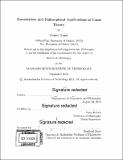| dc.contributor.advisor | Vann McGee. | en_US |
| dc.contributor.author | Grant, Cosmo(Cosmo Douglas) | en_US |
| dc.contributor.other | Massachusetts Institute of Technology. Department of Linguistics and Philosophy. | en_US |
| dc.date.accessioned | 2020-03-09T18:53:25Z | |
| dc.date.available | 2020-03-09T18:53:25Z | |
| dc.date.copyright | 2019 | en_US |
| dc.date.issued | 2019 | en_US |
| dc.identifier.uri | https://hdl.handle.net/1721.1/124098 | |
| dc.description | Thesis: Ph. D. in Linguistics, Massachusetts Institute of Technology, Department of Linguistics and Philosophy, 2019 | en_US |
| dc.description | Cataloged from PDF version of thesis. | en_US |
| dc.description | Includes bibliographical references (pages 102-113). | en_US |
| dc.description.abstract | I investigate three questions. The first belongs to game theory: When will people play a Nash equilibrium? The second, to decision theory: Why maximize expected value? The third, to the philosophy of language: How should we work out the meaning of a sentence? What unites my dissertation is a decision-theoretic approach to games, and a game-theoretic approach to meaning. An epistemic characterization of a solution concept shows under what epistemic conditions the players behave as the solution concept describes. Chapter 1 is about epistemic characterizations of Nash equilibrium. First, I argue that theorists have slipped between two interpretations of Nash equilibrium: strategic and doxastic. As a result, they've drawn unwarranted conclusions from the characterizations. Second, following a broader discussion of the role of solution concepts, I assess doxastic equilibrium on its own merits. I argue that it doesn't deserve the attention it's received. | en_US |
| dc.description.abstract | A key theme of Chapter 1 is the decision-theoretic approach to games: asking what you should do in a game is just a special case of asking what you should do in a decision problem. But what should you do in a decision problem? A standard answer is that you should maximize expected value, because maximizing expected value does best in the long-run. In Chapter 2, I adapt an idea well-known in economics but little known in philosophy-maximizing expected growth rate-to argue that the long-run defense of maximizing expected value isn't sound. In Chapter 3, I take for granted the decision-theoretic approach to games and apply it in the philosophy of language. David Lewis showed how conventions arise from repeated coordination games, and, as a special case, how meanings arise from repeated signaling games. I build on Lewis's framework. | en_US |
| dc.description.abstract | I construct coordination games in which the players can be wrong about their conventions, and signaling games in which the players can be wrong about their messages' meanings. The examples put pressure on the Elicitation Method, a typical method in semantic fieldwork, according to which we should work out the truth-conditions of a sentence by eliciting speakers' judgments about its truth-value in different situations. | en_US |
| dc.description.statementofresponsibility | by Cosmo Grant. | en_US |
| dc.format.extent | 113 pages | en_US |
| dc.language.iso | eng | en_US |
| dc.publisher | Massachusetts Institute of Technology | en_US |
| dc.rights | MIT theses are protected by copyright. They may be viewed, downloaded, or printed from this source but further reproduction or distribution in any format is prohibited without written permission. | en_US |
| dc.rights.uri | http://dspace.mit.edu/handle/1721.1/7582 | en_US |
| dc.subject | Linguistics and Philosophy. | en_US |
| dc.title | Foundations and philosophical applications of game theory | en_US |
| dc.type | Thesis | en_US |
| dc.description.degree | Ph. D. in Linguistics | en_US |
| dc.contributor.department | Massachusetts Institute of Technology. Department of Linguistics and Philosophy | en_US |
| dc.identifier.oclc | 1142634542 | en_US |
| dc.description.collection | Ph.D.inLinguistics Massachusetts Institute of Technology, Department of Linguistics and Philosophy | en_US |
| dspace.imported | 2020-03-09T18:53:25Z | en_US |
| mit.thesis.degree | Doctoral | en_US |
| mit.thesis.department | Ling | en_US |
